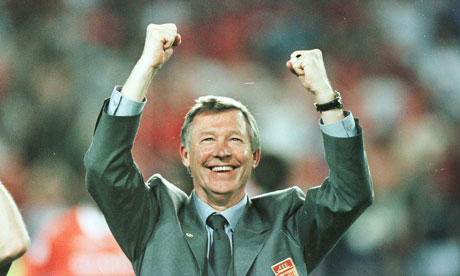
Sir Alex Ferguson has always understood that he must change with the times, but the Manchester United manager, who ends 2011 with his 70th birthday, is also a traditionalist. On occasion he still draws on methods so long-established that they give onlookers a twinge of nostalgia. When Ferguson embarked on a tribute to Tottenham Hotspur's form this season, minds could have turned to Bob Paisley's "toffee". The great Liverpool manager always believed that the compliments he handed out might be as harmful to the opposition as tooth decay.
It is unlikely that Tottenham paid much attention and there was plenty of bite to their win at Norwich in midweek. Of course, an accolade for Harry Redknapp's squad could be taken as an indirect slight on Manchester City. Ferguson, whose team host Blackburn Rovers today, had spoken briefly and carefully about them. He most likely concluded that these rivals are to be handled with particular care and was just waiting quietly to see what effect the fall from the Champions League may have.
Ferguson, having weighed up City's loss to Chelsea and draw at West Bromwich Albion, opened up a new phase when he chided Roberto Mancini's side for allowing their advantage to be whittled down so soon that they head the Premier League purely on goal difference. United themselves tumbled from the Champions League and you now wonder whether it is the nature of the reaction by each club that will shape the outcome of the season.
The miserable nature of Ferguson's departure from the tournament, with that 2-1 loss in Basel, is not to be understated. United, after all, had needed a last-minute goal against the Swiss to scramble a draw at Old Trafford. Over three hours of football their inferiority to Basel in the Champions League context had been established beyond doubt. A manager of a major club would usually be castigated for that and there is no denying that it was an atrocious outcome considering that Basel ought to have been at a terrible disadvantage.
Ferguson's record, however, indemnifies United against immediate ridicule. Onlookers are always ready for an immediate resurgence. The side have since won four matches in a row, scoring 16 goals in the process. While the fixture list was gentle with Ferguson, considering that Fulham, currently 13th in the table, were the highest ranked opponents, other clubs would have dreaded the toll that humdrum games could take on footballers dismayed to be out of Europe.
Following the bleakness in Basel, seven of the line-up also started in the 4-1 defeat of Wolverhampton Wanderers at Old Trafford. It might not have been the most challenging of fixtures but players weighed down with disappointment can become a barrier to their own success. In the event nothing was allowed to impede United, who had two goals by the 27th minute. No one was agog, but it is a precious knack for a club so frequently to do what is expected of it.
Becoming a septuagenarian will not see Ferguson turn into a bore harking back to the way things used to be. There is too much vitality and obsessiveness in him for that. His former assistant Archie Knox remembers getting the better of Ferguson over a series of Trivial Pursuit games during Scotland's 1986 World Cup campaign and knows that the manager will recall it just as clearly. A sense of proportion would be ruinous to him.
It is a combination of stamina, intelligence and, at heart, the fixation with the game itself that keeps Ferguson to the fore. In view of his temperament, it was not such a surprise that the growing importance of squad rotation was seized upon early, with stirrings of interest in the concept evident in 1993. By the same token, the craving for honours runs so deep that even vanity cannot stand in its path. He knew that he should not be the sole influence, even if he continues to be the most potent one.
Ferguson would have appreciated that a single European Cup in his time with United did not suffice, but a process of adaptation had to be accepted. The United that retook the trophy in a penalty shoot-out against Chelsea in 2008 had traded some flair for a little more security and Ferguson, with that aim in mind, devolved some of his powers to Carlos Queiroz, who was in his second spell at the club. It was a surprising step.
Ego was not permitted to impede ambition and Queiroz was able to introduce better organisation. In the seven matches of the 2008 Champions League knockout phase United conceded only two goals. It was not an approach with which Ferguson or the club had a natural affinity. Back in 1999, the United defence had been breached on three occasions in the semi-final with Juventus alone.
A craving for victory is not so unusual a trait. Ambition is common enough, but Ferguson stays to the fore because of a constant readiness to change with the times. As the Queiroz episode showed, the craving for honours runs so deep that he is even ready to embrace humility now and again.

